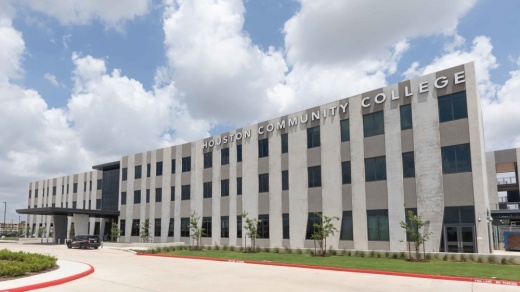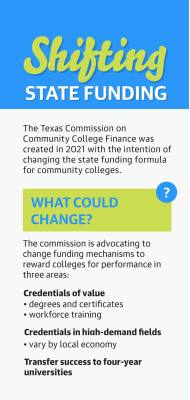Going into the 88th Texas legislative session in 2023, the state may shift from focusing on enrollment to student outcomes in determining funding for colleges.
Information from the Texas Commission on Community College Finance, which was appointed by the state in 2021 and is overseeing the proposed changes, indicates 65% of 5,000 respondents to a July and August survey by the Texas Higher Education Coordinating Board are in favor of changing the state funding to be outcome based.
HCC Chancellor Cesar Maldonado said it is too early to tell how the recommendations will impact college finances. However, HCC does expect an increase in funding.
“In our internal models, we’re plugging numbers in, and we do see a difference—an increase in funding—but it’s going to be contingent on what the award amount is per degree,” he said.
Houston Community College System officials said they hope there will be a tangible benefit in its dual-credit program, for which the recommendations may cost the college $6 million less per year, Maldonado said.
“That is a number that is very, very real for us,” he said. “One of the reasons we waive tuition [in dual credit] is because we look at it as an access issue for students.”
Outcome-based funding
Community colleges receive $1.3 million annually with additional funding available based on factors such as the number of student contact hours, or hours of scheduled instruction, according to information from Dallas-based nonprofit Texas 2036.
HCC, which has a Katy campus, has seen a decrease in its student headcount systemwide, dropping from 88,228 in 2013 to 83,034 in 2020, per HCC data.
Budget documents show tuition revenue declined after fiscal year 2019-20, dropping from $115.5 million to about $102.5 million for FY 2022-23, indicating fewer students enrolled.
A Sept. 12 presentation from the Texas Commission on Community College Finance stated there is demand to align funding with three outcomes: credentials of value, credentials in high-demand fields and transfer success.
Lyle McKinney, associate professor of educational leadership and policy studies at the University of Houston, said community colleges have traditionally been underfunded compared to four-year universities.
“We’re trying to design an effective outcome-based funding model that incentivizes institutions in the right way to improve student success but also doesn’t penalize them,” he said.
HCC will receive 17.1% of its total revenue from the state, 27.6% from tuition and 49% from local taxes in FY 2022-23. State funding will total $63.6 million for FY 2022-23, a 4.4% decline from the prior year due to declining enrollment, HCC officials said.
Meanwhile, dual-credit reimbursements would allow HCC to maintain lower tuition, HCC Executive Director of Financial Aid JoEllen Price said. This comes as HCC’ tuition is $2,541 per 15 credit hours in the 2022-23 school year, per the Texas Higher Education Coordinating Board.
Programmatic benefits
Of the recommendations, Price said she is most excited about the potential for outcome-based funding for credentials of value as HCC offers short-term continuing education programs.
Price is eyeing funding for these semester long programs, which she said equip students with strong skills to thrive in these industries.
The college does not receive any federal funding for these programs and a very small amount from the state, Price said. These recommendations could also bring students more opportunities for financial aid, she said.
“If we can reduce or eliminate [a financial barrier] altogether, ... those are the [recommendations] we are going to advocate for,” she said.
Dual credit, marketed toward high school students to get them involved in higher education early, is one program set to benefit, Price said.
Under the recommendations, HCC, which waives tuition for dual-enrollment students, would receive reimbursement from the state for those students for the first time, Maldonado said. Rima Adil, dean of students for the HCC Northwest system, which includes the Katy campus, said dual credit is free; however, there is a flat fee of $65 charged to students who reside outside the system’s service area.
She added students can take either an academic or technical route. These recommendations would help diversify student’s options within the dual-credit program, she said.
Students participating in the primarily technical programs can receive credentials while still in high school, Adil said. These students can work directly with a company through apprenticeships.
“Whether it is air conditioning, refrigeration or welding, those courses are also offered at the high school, so when students graduate, they can graduate with a skill,” Adil said.
Adil said HCC has also increased its team of admission advisers from two to 11 staff members since 2021 to provide more in-depth guidance to potential students.
“We are reviewing our programs, adding new programs to meet the demands of our community and our industry,” Adil said.
Modernizing the formula
The enrollment-focused funding formula has been used by community colleges for at least the past 20 years, and as the state Legislature grapples with the commission’s recommendations, any change will be a step toward the future, Maldonado said.
“Our original funding formula was very much like universities, but the college’s role over time has transformed to be able to meet the needs of the economy and a lot of the businesses...,” he said.
That includes providing a pipeline for technicians and tech-focused workers; HCC would feed a tech-sector where employment grew 47% nationwide from 2010-19 at 3.9 million tech-sector workers, according to The Brookings Institution, a Washington, D.C. research think tank.
Meanwhile, HCC has experienced an 11% growth since 2010 in the system’s dual-credit enrollment as students look to the program to earn early college credits, according to the college’s fall dual-credit enrollment data.
Ensuring the goals of large colleges, small colleges and industries are met will be some important keys, Maldonado said.
“To get a foundational aspect approved by the Legislature and the coordinating board will have long-term implications for community colleges in Texas,” he said.








